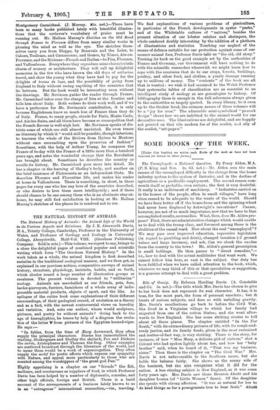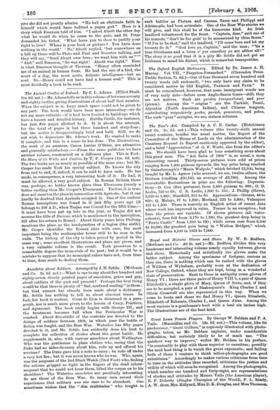Bits of Gossip. By Rebecca Harding Davis. (A. Constable and
Co. 58. net.)—The title which Mrs. Davis has chosen to give to her book does not represent its real character. It has, it is true, for the most part, the form of personal anecdote ; but it treats of serious subjects, and does so with unfailing gravity. Mrs. Davis's recollections go back to before the Civil War. She lived in a Virginian village to which her family had migrated from one of the cotton States ; and she wont after- wards to New England. She has some striking stories to tell about all these places. The chapter entitled " In the Far South," with its extraordinary pictures of life, with its rough-and- ready justice, and its family feuds, given in the most restrained and matter-of-fact way, is very striking. There is the story, for instance, of how " Miss Mary, a delicate girl of sixteen," shot a Colonel who had spoken lightly about her, and how her " baby brother" said, when ho heard of it, "That was my business, sister." Then there is the chapter on " The Civil War." Mrs. Davis is not unfavourable to the Southern cause, but she holds the balance fairly. She shows us the seamy side of the business, but she also recognises what it did for the nation. A less stirring subject is New England, as it was some forty years ago. Mrs. Davis saw there Bronson Alcott and his daughter Louisa (of "Little Women" fame). Of the daughter she speaks with strong affection. "It was as natural for her to do kind things as for a pomegranate tree to bear fruit." Alcott
pere she did not greatly admire. "He had an obstinate faith in himself which would have befitted a pagan god." Here is a story which Emerson told of him. " I asked Alcott the other day what he would do when he came to the gate, and St. Peter demanded his ticket. What have you to show to justify your right to live ? Where is your book or picture ? You have done nothing in the world.' No: Alcott replied, but somewhere on a hill up there will be Plato and Paul and Socrates talking, and they will say, " Send Alcott over here ; we want him with us."'" "And," said Emerson, "he was right ! Alcott was right." Here is what Emerson thought of Thoreau. "Henry often reminded me of an animal in human form. He had the eye of a bird, the scent of a dog, the most acute, delicate intelligence—but no soul. No—Henry could not have had a human soul." This is most decidedly a book to be read.
The Ancient Castles of Ireland. By C. L. Adams. (Elliot Stock. 10s. f3d. net.)—Mr. Adams tells us in this volume of between seventy











































 Previous page
Previous page